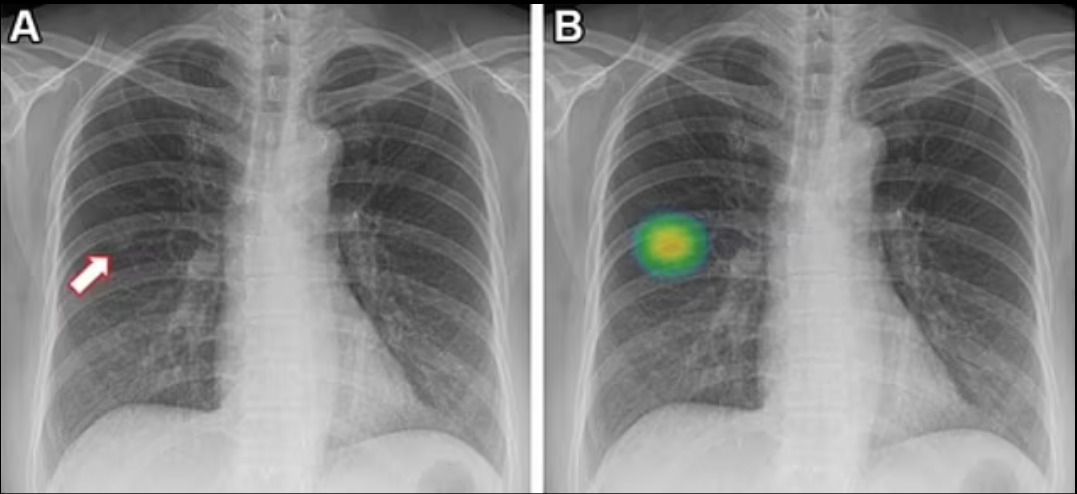Published on
Updated
Reading 3 mins.
According to a new Korean study, computer-aided detection software based on AI would be more accurate in detecting lung cancer than radiologists and doctors alone.
Artificial intelligence multiplies the possible applications allowing better diagnosis or screening based on imaging data. After successful studies on the use of AI in screening for breast or bowel cancer, artificial intelligence could change lung cancer screening according to a team of Korean scientists.
The stakes are high: lung cancer is often diagnosed late, after it has already spread to other organs. Early detection could improve its prognosis. In a real environment, software based on machine learning would in theory be more sensitive and less likely to miss tumors that need immediate treatment.
Can AI improve screening for lung nodules?
The researchers therefore included 10,476 patients, who underwent chest X-rays at a screening center between June 2020 and December 2021. Rarely according to the lead author, almost all enrolled participants were included, making this a real clinical setting.
“Detection of lung nodules, a primary finding of lung cancer, is one of the crucial tasks of chest X-rays“said study co-author Jin Mo Goo from the Department of Radiology at Seoul National University Hospital in Korea.”Many studies have suggested that AI-based computer-aided detection software can improve the performance of radiologists, but they are not widely used.“.
Lung nodules, which are abnormal growths that form on the lungs, are very common and usually form as a result of previous lung infections. In rare cases, they can be a sign of lung cancer. AI can be a powerful tool to help identify lung nodules, especially when radiologists are faced with a high volume of cases.
Classic detection versus AI-assisted detection
The study took into account age, sex and history of lung cancer. One in nine (11%) were current or former smokers. Participants were randomly and equally divided into two groups – IA or non-IA. The radiographs of the first group were analyzed by one of the three radiologists using the AI. Those of the second group were performed without the technology in a classic scheme.
Pulmonary nodules were identified in 2% of patients. The analysis showed that the detection rate of workable lung nodules on chest X-rays was higher with AI assistance (0.59%) than without AI assistance (0.25%) . There was no difference in the rates of false recommendations between the RN-interpreted and non-RN groups.

A technology that works on all populations
For Dr. Goo, lead author of the study, the discovery confirms the interest of AI in screening for lung cancer.
“Our study provided strong evidence that AI could really help with chest X-ray interpretation. This will help identify lung diseases, especially lung cancer, more effectively at an earlier stage.”
The results, published in Radiology, also suggest that AI works consistently in different populations, even for those with diseased or postoperative lungs. The technology could well become indispensable: AI has already been shown to help predict several cancers, as well as intestinal diseases, Alzheimer’s disease, heart attacks and dementia.
Standard x-ray or low dose scanner?
Recently, American researchers have developed another model based on Artificial Intelligence capable of predicting the occurrence of future lung cancer up to six years in advance, thanks to a single low-dose scanner.
As we can see, artificial intelligence makes it possible to improve lung cancer screening. An issue recently identified by the High Authority for Health which recommended in February 2022, the implementation of a small-scale experiment in the screening of lung cancer in smokers.
With more than 46,000 new cases per year, lung cancer remains the 3e most common cancer in France. And although its 5-year survival rate is increasing, it remains quite poor for the time being, given the sometimes too late discovery.
